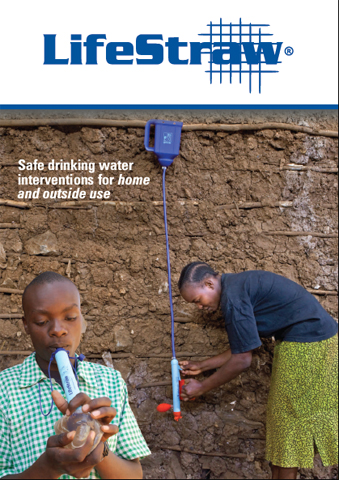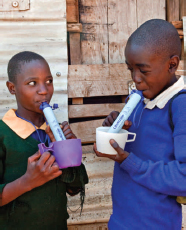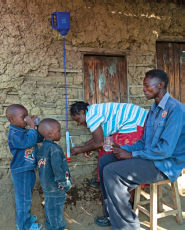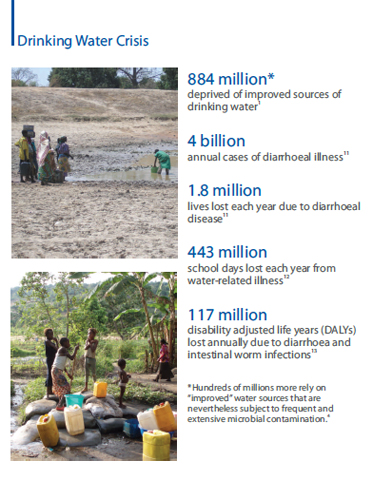Navigation
Close to One Million Water Filters Delivered to Rural Kenyans in Lifestraw Carbon For Water Program
Nearly 900,000 LifeStraw® Family water filters will be installed in almost all households in the Western Province of Kenya thanks to a program which began on 26 April 2011.
 |
Nearly 900,000 LifeStraw® Family water filters will be installed in almost all households in the Western Province of Kenya thanks to a program which began on 26 April 2011. The province-wide, door-to-door, free distribution program was designed to last almost six weeks and reach about 90 percent of all homes without access to safe municipal water sources. It aims to provide point-of-use water filtration for Kenyan residents for at least 10 years and do so without any cost to local residents, governmental agencies or donor groups.
The program, called “Carbon for Water” is spearheaded by Vestergaard Frandsen. The European company specializes in disease control textiles, including the LifeStraw® Family water filters that will be given to Kenyan residents.
The program will be paid for by Vestergaard Frandsen and reimbursed with carbon financing. This unique funding model gives companies in developed countries potential revenue, in the form of carbon credits, for sponsoring programs that reduce greenhouse gas emissions in developing countries. Carbon credits can then be sold to carbon credit buyers that want to reduce their carbon footprint or improve their environmental stewardship. The revenue generated will largely be reinvested into the project to make it sustainable for at least ten years.
Putting Carbon Financing to Work
 |
Each LifeStraw® Family water filter delivers at least 18,000 liters of U.S. EPA-quality drinking water, enough to supply a family of five with cleaning drinking water for at least three years. Kenyans who receive them will no longer have to treat water by boiling it using wood fuel, which generates greenhouse gasses. This behavioral change is expected to produce more than two million tons of carbon emission reductions annually.
 |
As the supplier of the water filters, Vestergaard Frandsen will earn the carbon credits. Since the company only gets paid for the performance of the water filters in reducing emissions, it has a strong incentive to invest the revenue it earns back into the program – to maintain and replenish the LifeStraw® Family water filters and to educate residents on proper and consistent usage.
Vestergaard Frandsen has received ongoing collaborative support from the United Nations Development Programme. In February 2011, after a rigorous validation process, the program was approved as a voluntary project under the prestigious Gold Standard certification scheme.
Vestergaard Frandsen is making the initial investment of USD$25 million needed to launch the program. “Start-up costs are especially steep considering the need to manufacture and transport close to a million LifeStraw® Family water filters, and to hire and train more than 4,000 community health workers to distribute them and educate residents on usage,” explained Mr. Mikkel Vestergaard Frandsen, CEO of the Group, Vestergaard Frandsen. “Longer term, the company will employ hundreds of Kenyans for at least ten years to maintain 19 repair and replacement shops that will be set up throughout Western Province, and to provide ongoing community education.
Once the program is operational, monitoring by an accredited independent auditor will take place every six months. The auditor will verify that the emission reductions are accurate, and carbon credits will only be issued after each verification.
 |
The Worldwide Water Crisis
“Innovative and sustainable solutions to the global water crisis are critically important,” explained Mr. Vestergaard Frandsen. Nearly 1.2 billion people in the world lack access to safe drinking water, more than 60% of whom live in Sub-Saharan Africa and Southern Asia. Water-borne disease is a leading cause of illness in the developing world. According to the World Health Organization, more than 3.5 million people die each year from water-related disease and 84% of these water-related deaths are in children ages 0 – 14. The WHO estimates the impact of diarrheal disease on children is greater than the combined impact of HIV/AIDS, tuberculosis and malaria.
 |
“Point-of-source solutions, including drilled wells and water pipes, often are not completed because of bureaucratic gridlock or are completed, but then deliver dirty water to thirsty consumers. Point-of-use solutions, such as LifeStraw® Family, are widely seen as the most effective intervention to deliver safe drinking water but have faced their own challenges, most notably the difficulty in sustaining them financially over an extended period of time,” Mr. Vestergaard Frandsen added.
Program Impact
The LifeStraw® “Carbon for Water” program holds the potential for long-term sustainability of a point-of-use solution. The program targets four of the eight UN Millennium Goals including: Goal 4: Reduce child mortality; Goal 5: Improve maternal health; Goal 6: Combat diseases; and Goal 7: Ensure environmental sustainability. It is also aligned with the U.S. Strategy for Meeting the MDGs which states that successful programs must address the need for sustainable development and create a strong link between cost-effective investment and measurable impact.
For up-to-date program news and documents, please visit http://www.carbonforwater.com.
Sponsorship
Vestergaard Frandsen (VF) is a European company specializing in disease control products. VF operates under a unique Humanitarian Entrepreneurship business model. This "profit for a purpose" approach has turned corporate social responsibility into its core business of creating life-saving products for the developing world. Strong support of the MDGs is a defining characteristic of the company. Its products are designed to prevent waterborne, vector-borne and neglected tropical diseases.
Vestergaard Frandsen has demonstrated commitment to working in this space through individual projects and collaboration with the UNDP. For more information, visit http://www.vestergaard-frandsen.com.
This article and images are from Vestergaard Frandsen.
Note:
Brochures available, click on the following, all PDF:
Search
Latest articles
Agriculture
- World Water Week: Healthy ecosystems essential to human health: from coronavirus to malnutrition Online session Wednesday 24 August 17:00-18:20
- World Water Week: Healthy ecosystems essential to human health: from coronavirus to malnutrition Online session Wednesday 24 August 17:00-18:20
Air Pollution
- "Water and Sanitation-Related Diseases and the Changing Environment: Challenges, Interventions, and Preventive Measures" Volume 2 Is Now Available
- Global Innovation Exchange Co-Created by Horizon International, USAID, Bill and Melinda Gates Foundation and Others
Biodiversity
- It is time for international mobilization against climate change
- World Water Week: Healthy ecosystems essential to human health: from coronavirus to malnutrition Online session Wednesday 24 August 17:00-18:20
Desertification
- World Water Week: Healthy ecosystems essential to human health: from coronavirus to malnutrition Online session Wednesday 24 August 17:00-18:20
- UN Food Systems Summit Receives Over 1,200 Ideas to Help Meet Sustainable Development Goals
Endangered Species
- Mangrove Action Project Collaborates to Restore and Preserve Mangrove Ecosystems
- Coral Research in Palau offers a “Glimmer of Hope”
Energy
- Global Innovation Exchange Co-Created by Horizon International, USAID, Bill and Melinda Gates Foundation and Others
- Wildlife Preservation in Southeast Nova Scotia
Exhibits
- Global Innovation Exchange Co-Created by Horizon International, USAID, Bill and Melinda Gates Foundation and Others
- Coral Reefs
Forests
- NASA Satellites Reveal Major Shifts in Global Freshwater Updated June 2020
- Global Innovation Exchange Co-Created by Horizon International, USAID, Bill and Melinda Gates Foundation and Others
Global Climate Change
- It is time for international mobilization against climate change
- It is time for international mobilization against climate change
Global Health
- World Water Week: Healthy ecosystems essential to human health: from coronavirus to malnutrition Online session Wednesday 24 August 17:00-18:20
- More than 400 schoolgirls, family and teachers rescued from Afghanistan by small coalition
Industry
- "Water and Sanitation-Related Diseases and the Changing Environment: Challenges, Interventions, and Preventive Measures" Volume 2 Is Now Available
- Global Innovation Exchange Co-Created by Horizon International, USAID, Bill and Melinda Gates Foundation and Others
Natural Disaster Relief
- STOP ATTACKS ON HEALTH CARE IN UKRAINE
- Global Innovation Exchange Co-Created by Horizon International, USAID, Bill and Melinda Gates Foundation and Others
News and Special Reports
- World Water Week: Healthy ecosystems essential to human health: from coronavirus to malnutrition Online session Wednesday 24 August 17:00-18:20
- STOP ATTACKS ON HEALTH CARE IN UKRAINE
Oceans, Coral Reefs
- World Water Week: Healthy ecosystems essential to human health: from coronavirus to malnutrition Online session Wednesday 24 August 17:00-18:20
- Mangrove Action Project Collaborates to Restore and Preserve Mangrove Ecosystems
Pollution
- Zakaria Ouedraogo of Burkina Faso Produces Film “Nzoue Fiyen: Water Not Drinkable”
- "Water and Sanitation-Related Diseases and the Changing Environment: Challenges, Interventions, and Preventive Measures" Volume 2 Is Now Available
Population
- "Water and Sanitation-Related Diseases and the Changing Environment: Challenges, Interventions, and Preventive Measures" Volume 2 Is Now Available
- "Water and Sanitation-Related Diseases and the Changing Environment: Challenges, Interventions, and Preventive Measures" Volume 2 Is Now Available
Public Health
- Honouring the visionary behind India’s sanitation revolution
- Honouring the visionary behind India’s sanitation revolution
Rivers
- World Water Week: Healthy ecosystems essential to human health: from coronavirus to malnutrition Online session Wednesday 24 August 17:00-18:20
- Mangrove Action Project Collaborates to Restore and Preserve Mangrove Ecosystems
Sanitation
- Honouring the visionary behind India’s sanitation revolution
- Honouring the visionary behind India’s sanitation revolution
Toxic Chemicals
- "Water and Sanitation-Related Diseases and the Changing Environment: Challenges, Interventions, and Preventive Measures" Volume 2 Is Now Available
- Actions to Prevent Polluted Drinking Water in the United States
Transportation
- "Water and Sanitation-Related Diseases and the Changing Environment: Challenges, Interventions, and Preventive Measures" Volume 2 Is Now Available
- Urbanization Provides Opportunities for Transition to a Green Economy, Says New Report
Waste Management
- Honouring the visionary behind India’s sanitation revolution
- Honouring the visionary behind India’s sanitation revolution
Water
- Honouring the visionary behind India’s sanitation revolution
- Honouring the visionary behind India’s sanitation revolution
Water and Sanitation
- Honouring the visionary behind India’s sanitation revolution
- Honouring the visionary behind India’s sanitation revolution

